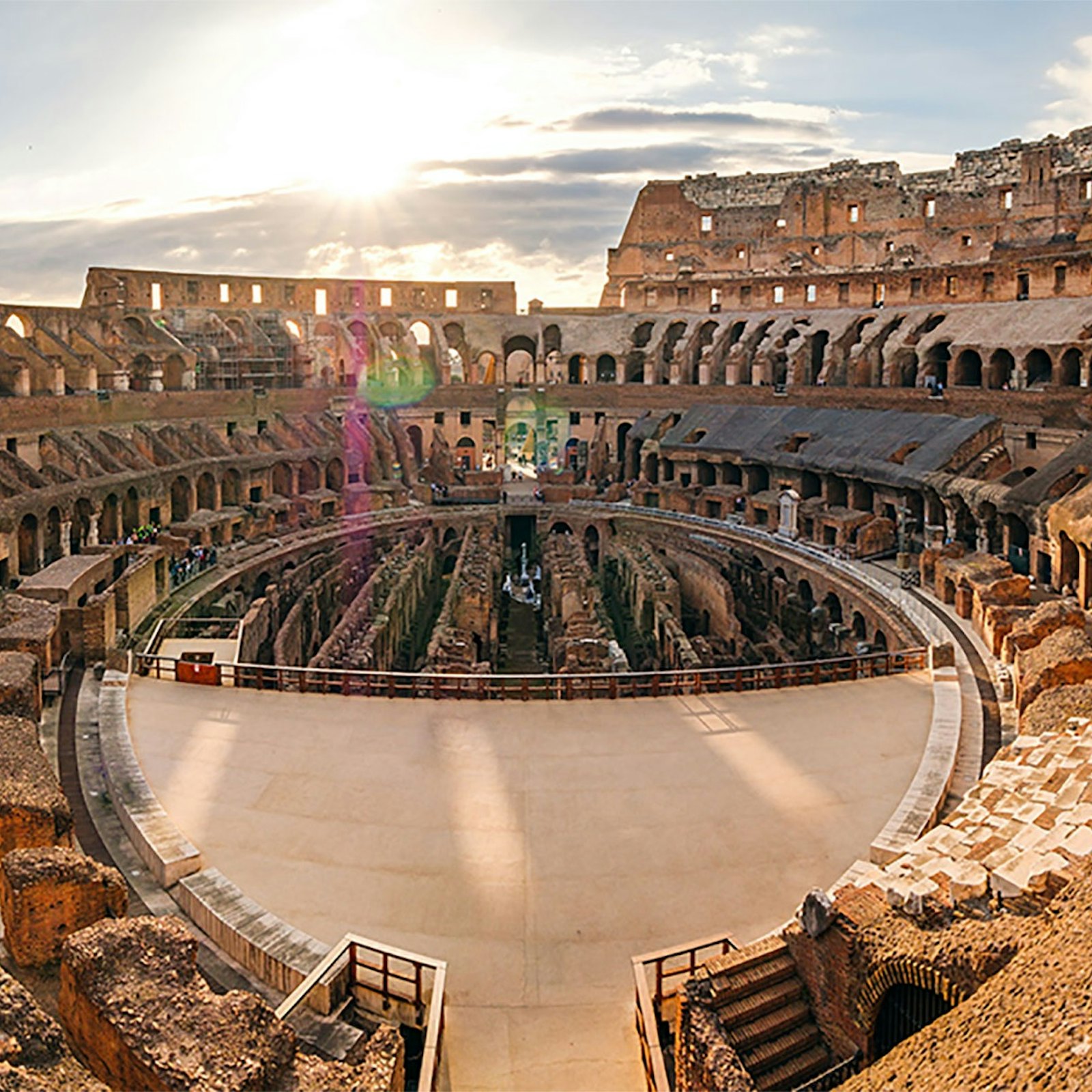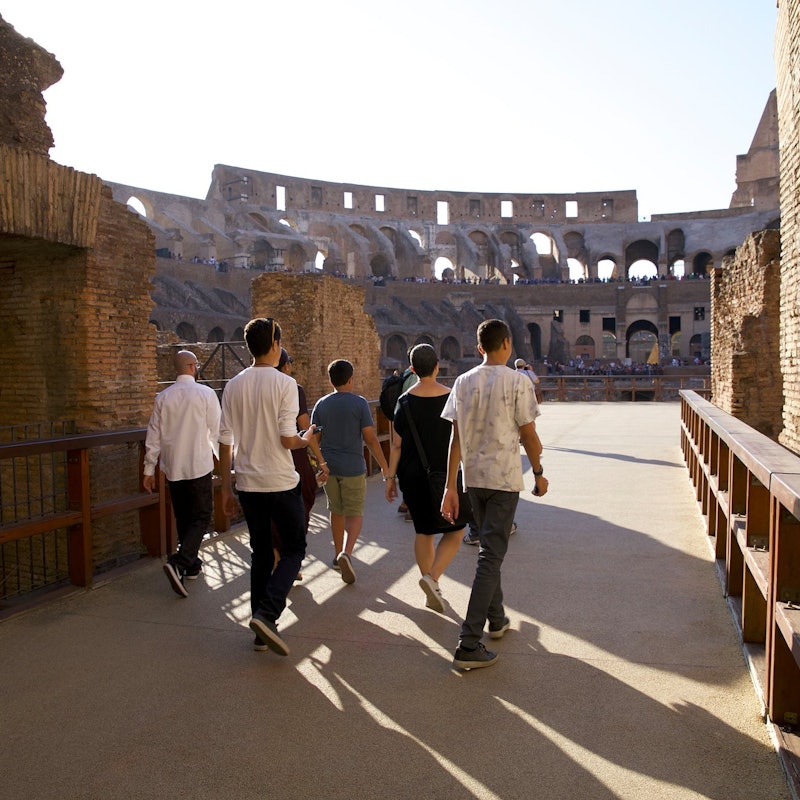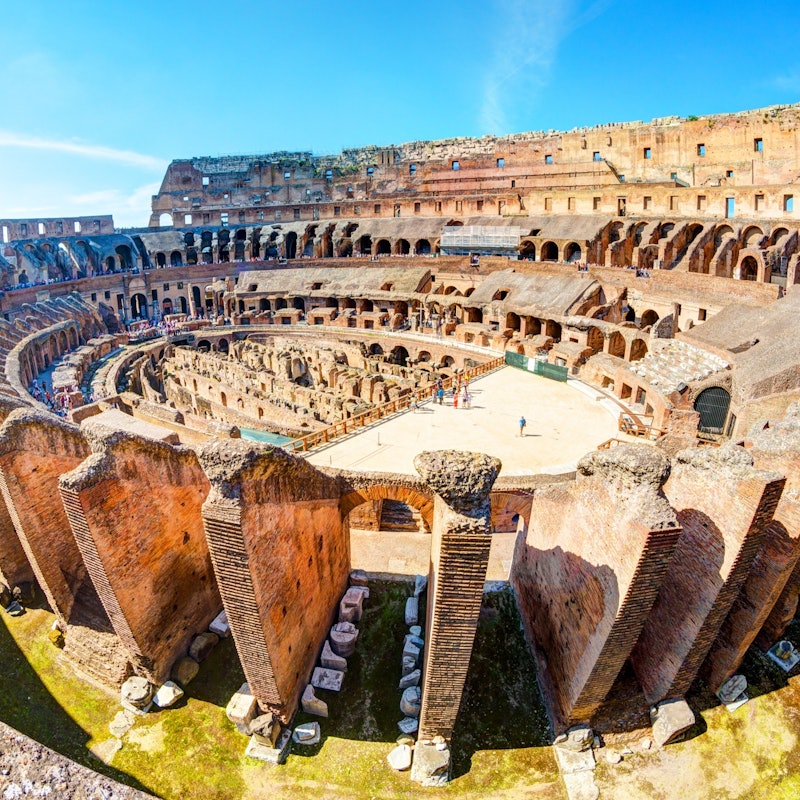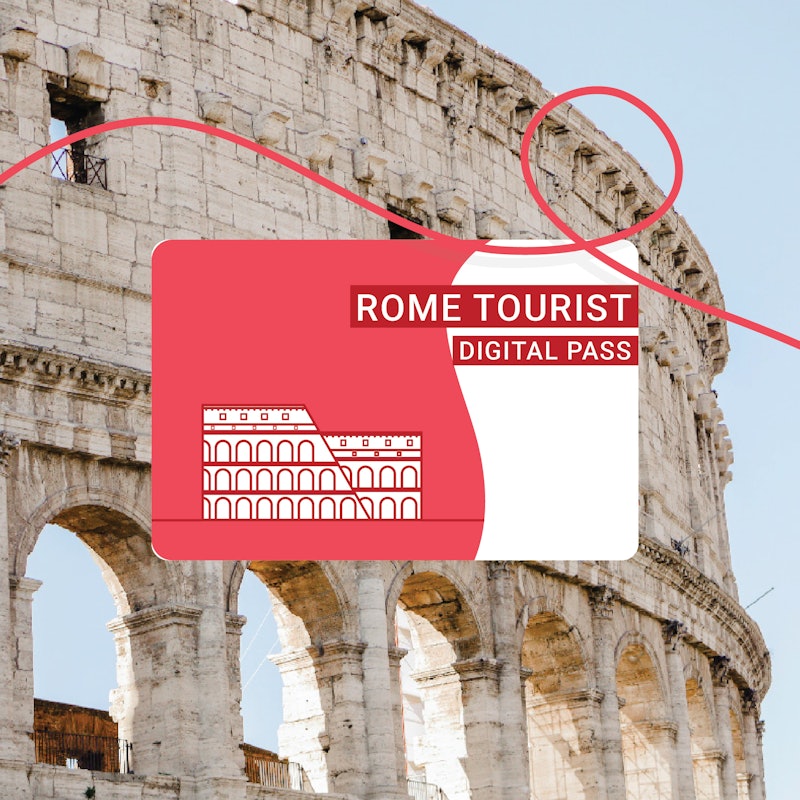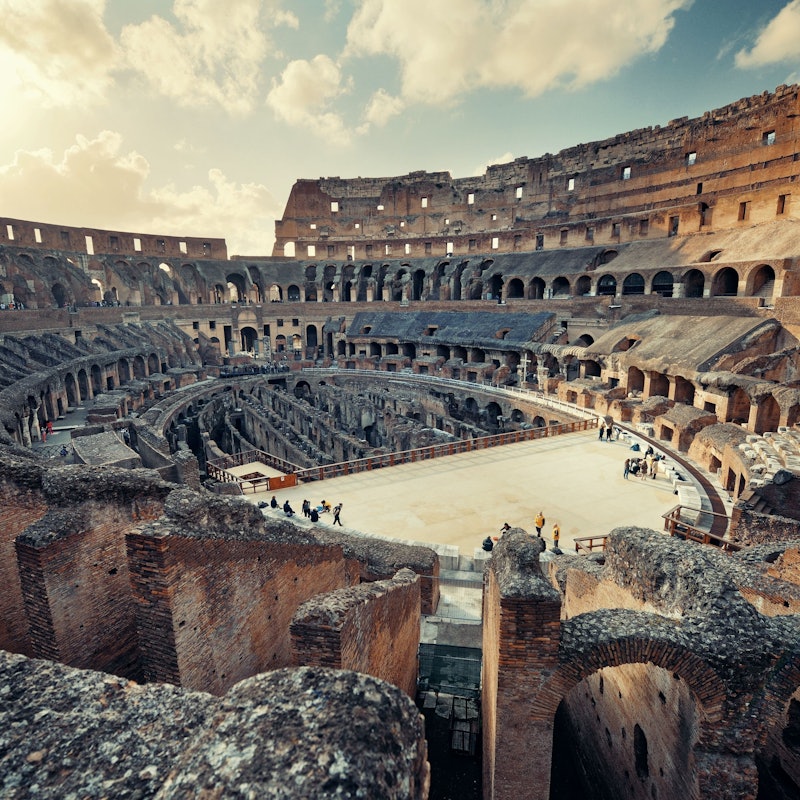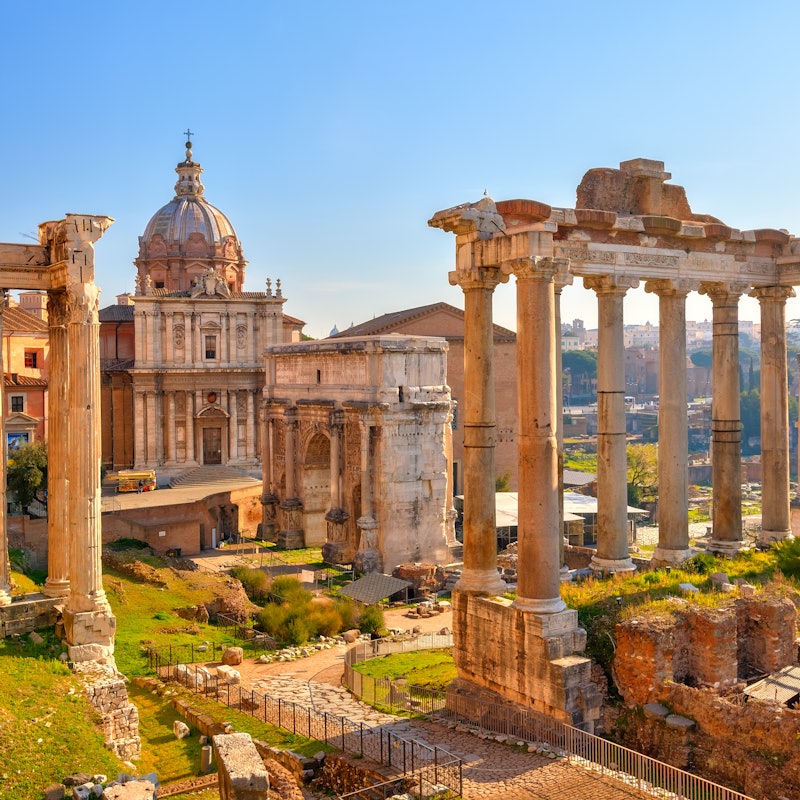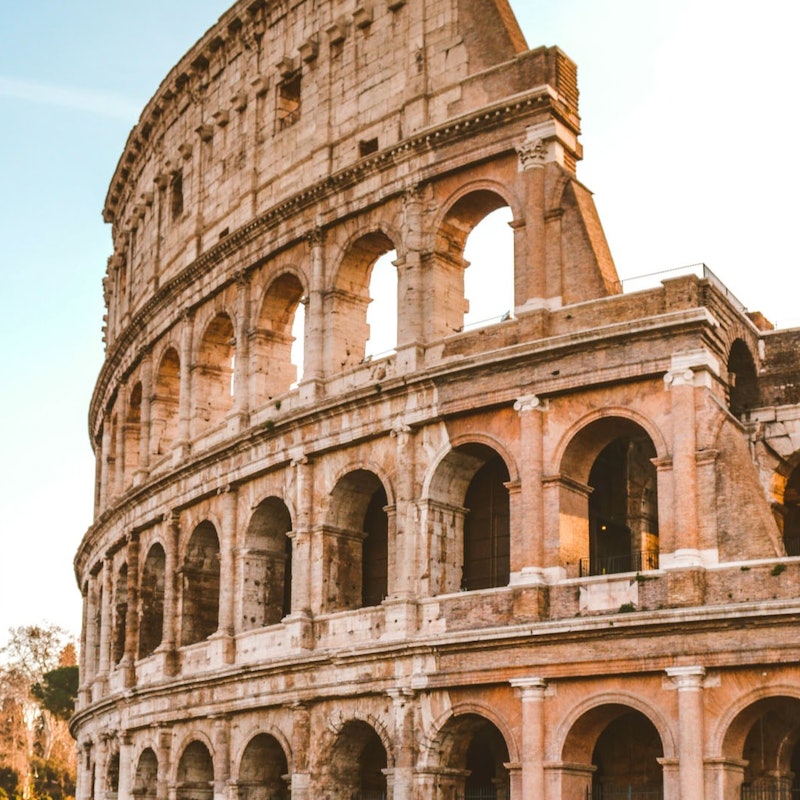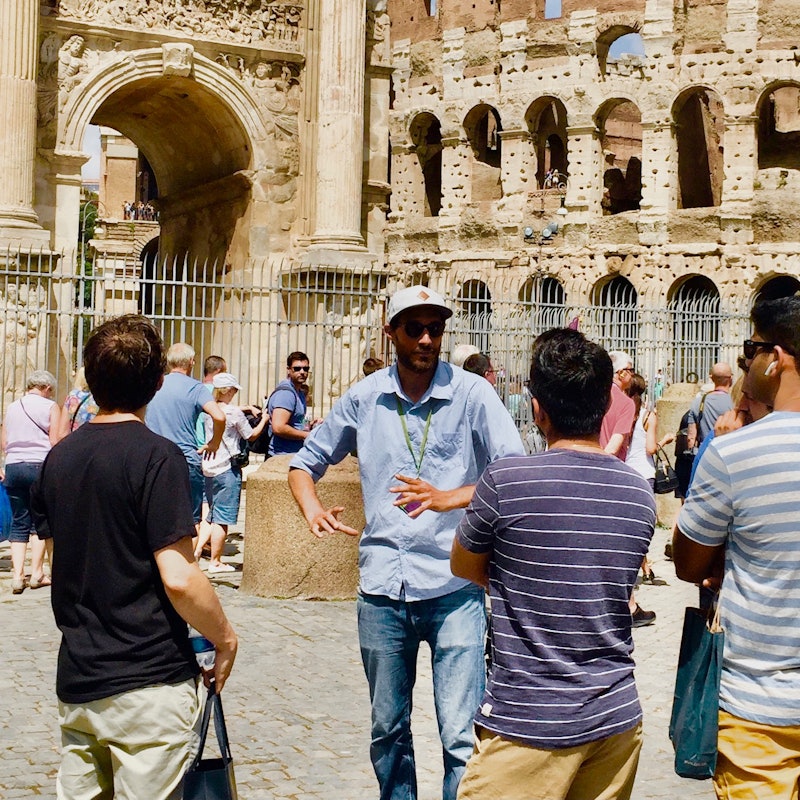Colosseum, Roman Forum & Palatine Hill
More TicketsHeading
More TicketsHeading
More TicketsColosseum Tickets and Information
- Colosseum Address: Piazzo del Colosseo, 1, Rome, 00184
Is the Colosseum Worth Visiting
- If you enjoy visiting UNESCO World Heritage Sites steeped in history, definitely, in our opinion, yes.
- If you want to see where real life gladiator battles used to take place, definitely!
What You Can See At The Colosseum
Depending on the choice of ticket, you can see:
- The different levels of the Colosseum along
- The Emperor's Box
- The Gladiator's Gate
- The intricate network of tunnels and chambers beneath the arena floor where the gladiators and wild animals used to wait for their turn to enter the grand stage.
- The arena floor
- The seating areas
Popular Colosseum Tickets
Colosseum: Priority Entrance Tickets
BESTSELLER
What's Included
- Priority access to the Colosseum
- Single entrance for Roman Forum & Palatine hill
- Access to Mamertine Prison
Colosseum, Roman Forum & Palatine Hill: Entry Ticket + Multimedia Experience
BESTSELLER
What's Included
- Priority access to the Colosseum
- Single entrance for Roman Forum & Palatine Hill
- Immersive 25-minute multimedia video of Ancient Rome before your visit
- Staff assistance at the meeting point and at the access of the Roman Forum & Palatine Hill
Colosseum, Roman Forum & Palatine Hill + Arena Floor: Entry Ticket
BESTSELLER
What's Included
- Entrance to the Colosseum & Arena Floor
- Entrance to Roman Forum & Palatine Hill
- Ancient Rome multimedia video (30 min)
- Paper city map
- Assistance at the meeting point
About The Colosseum
The Colosseum in Rome is one of the most famous landmarks in the world. It was built by Roman Emperors 'Vespasian' and 'Titus' between 72-80 C.E, and was used as an amphitheatre to entertain thousands, as home to the infamous Gladiator battles, as well as animal hunts, mock naval battles and even public executions.
The Colosseum was actually known as the 'Flavian Amphitheatre' and not the Colosseum. Had you asked for directions to the Colosseum at the time, the locals wouldn't have known what you were talking about! The Colosseum now welcomes around 6 million people each year and, along with Vatican City, is one of Rome's most popular tourist attractions!
According to records it was actively used for around 500 years until the 6thcentury and now proudly holds the title of one of the Seven Wonders of the Modern World and also listed as a UNESCO World Heritage Site under the 'Historic Centre of Rome' listing.
The Architecture & Design
The Colosseum was build using concrete, sand and stone and the outer façade is made from travertine limestone. The design incorporates a complex system of ramps, tunnels and elevators underneath the arena, which is where the gladiators and animals were all kept.
It's elliptical shape and towering façade makes it instantly recognisable. It had a capacity to hold up to 80,000 spectators and it was a testament to Roman engineering ingenuity! The outside is covered with three distinct orders of columns - Doric, Ionic, and Corinthian, which also reflect the grandeur of classical Roman architecture.
Spectators at the Colosseum were assigned seats according to their wealth and status, with the various areas offering different views, much like going to a concert now - the best views have the most expensive tickets!
Bearing in mind the Colosseum was completed in around 80AD, some of the mechanical processes used to open the trapdoors on the arena floor were incredible feats of engineering, which allowed the dramatic entrance for the gladiators and wild animals on the arena floor!
As the Colosseum is so old it has suffered significant damage over the centuries. An earthquake caused major damage in 1300's along with water damage due to the poor ground quality underneath as well as stone-looters. It has been through multiple renovation projects over the years to stop its decline and to preserve its architectural glory for the public to still enjoy today.
In fact, due to renovations, in 2017 they have re-opened the 4th and 5th tiers of the Colosseum, which now offers views of the surrounding areas that haven't been available for a considerable amount of time!
CLICK HERE TO SEE ALL COLOSSEUM TICKET OPTIONS
About The Roman Forum
The Roman Forum is in the heart of Rome and was originally built as a marketplace and the centre of political, commercial and social life in Rome. It became functional for many purposes including elections, public meetings and speeches.
It would have been home to shops, markets and stalls offering local goods and services. It was also home to several important buildings such as the Senate House, called the Curia, and the Speaker's Platform (called the Rostra), as well as the local law courts, the Basilica Julia.
The Roman Forum was home to some incredible architecture including the Temple of Saturn, the Arch of Septimius Severus, the Temple of Vesta and the Basilica of Maxentius.
Historical events such as the funeral of Julius Caesar would have also been held at the Roman Forum as well as the trail of apostle Saint Paul!
Incredibly the Roman Forum was buried for centuries and it wasn't recovered until the 18th century when excavation works help to uncover it again.
Things to see at The Roman Forum: There are several temples to see plus other highlights include Via Sacra, Arch of Titus, Arch of Septimus Severus, Temple of Antoninus and Faustina, Basilica of Maxentius and Constantine, The Curia and Column of Phocas.
The Roman Forum Address: Via della Salara Vecchia, 5/6, Rome, 00186.
About Palatine Hill
Although located quite closely to The Roman Forum and the Colosseum, Palatine Hill is a separate location to its slightly more famous neighbours. Palatine Hill is where the aristocrats and emperors of the time used to live and with that was one of the most desirable neighbourhoods. It was one of the seven hills of ancient Rome and holds important historical and archaeological significance as it's believe to have been the birthplace of Rome itself, by Romulus, the mythical founder, in 753 BC.
Today Palatine Hill is an open-air museum which allows visitors to explore the ancient ruins and imagine how life was at the time.
What you will see at Palatine Hill: Ruins and a lot of them! But they are fascinating as you can picture what life used to be like there when the emperors and aristocrats lived there with their imperial palaces and lavish gardens that would have been home to big statues and shows of wealth and power. We would suggest you try and find the ruins of Domus Flavia, House of Livia, House of Augustus, Farnese Gardens, Hippodrome of Domitian and Palatine Museum.
The Colosseum, Palatine Hill and The Roman Forum Fun Facts
- Records suggest it only took around 8 years to build the Colosseum. When you think of the fact that they didn't have the same heave duty building equipment that we have access to today, 8 years really isn't very long at all! Construction began in 72 A.D and suggested to have completed in 80 A.D.
- Much like stadiums today, the Colosseum offered different seats depending on your wealth and status with different areas offering better or worse views!
- The Colosseum used to seat up to 80,000 spectators.
- Here is an interesting one.... It wasn't called the Colosseum! It was actually called 'The Flavian Amphitheatre'! Had you asked for directions to the Colosseum at the time, they would have looked at you blankly!
- The Colosseum is one of the 7 wonders of the modern world.
- Palatine Hill is where the rich and wealthy and aristocrats and emperors used to live and offered incredible views of the surrounding areas.
- The Roman Forum was the centre of Rome life at the time. It also supposedly where Romulus and his brother established Rome itself!
- Did you know that around 16,000 people visit the Colosseum each day and that increases to around 25,000 people during the peak summer period! Along with The Vatican, the Colosseum is Rome's most popular tourist attraction!
- The name 'Colosseum' is believed to have originated from the colossal statue of Nero that once stood nearby!
- The Colosseum is the largest ever amphitheatre ever built and was capable of holding up to 80,000 people!
- TRAP DOORS - The Colosseum had complex system of trapdoors and lifts which allowed for surprise entrances and exits during its matches!
- The Colosseum is one of the most iconic symbols or Rome and is even featured on the Italian version of the five-cent euro coin!
- The network of tunnels underneath the Colosseum are known as the 'Hypogeum' and its where the Gladiators, animals and props were kept.
- The Colosseum has been struck by lightning on multiple occasions and some of the damage is still visible today!
Useful Information About The Colosseum, Rome
The Colosseum, Rome Address
Colosseum, Piazzo del Colosseo, 1, Rome, 00184
How to get to the Colosseum
- Metro: From Rome Termini Station simply take metro Line B and get off at 'Colosseo' Station (Colosseum Station). The trip is less than 5 minutes from Rome Termini.
- Bus (tickets can be bought at tobacco shops and newspaper stands): Local Buses 3, 8, 30, 40, 60, 75, 38, 87, 810 and 870 all sop at the Colosseum Bus Stop which is called 'Piazza del Colosseo'
- North Rome Buses: Lines 38 and 75
- South Rome Buses: 175 and 271 both go to the Colosseum
- Tram (you can purchase tickets at newspaper stands, tobacco shops or metro stations): Tram lines 3 and 8 go to the Piazza del Colosseum
- Car Parking at the Colosseum: Roma - Parcheggio Park Colosseo | Park Services Colosseo | Onepark - Parcheggio Roma - Colosseo & Parcheggio San Pierto in Vincoli are all local car parking facilities, but please note spaces may be very limited.
Colosseum Opening Hours
- Monday: 09:00 - 19:15
- Tuesday: 09:00 - 19:15
- Wednesday: 09:00 - 19:15
- Thursday 09:00 - 19:15
- Friday: 09:00 - 19:15
- Saturday: 09:00 - 19:15
- Sunday: 09:00 - 19:15
Hint to avoid the BIG queues at the Colosseum
Book tickets in advance to avoid the MASSIVE queues that form for the Colosseum and where possible, try and visit in the morning. Several of our tickets also come with priority entrance.
Colosseum, Roman Forum & Palatine Hill
More TicketsColosseum, Roman Forum & Palatine Hill Tickets
FAQ
Generally, yes, you need a ticket to enter the Colosseum. There are certain times of the year when you can enter for free, but you still need a free-entry ticket in the event and they are limited. For standard entrance, you do need to purchase a ticket for the Colosseum. The basic entrance Colosseum ticket starts from €24.00 and that also gets you entry to Palatine Hill and the Roman Forum, which are both located a short distance from the Colosseum.
No. You need to buy the appropriate ticket to get access to the Colosseum Arena Floor and or the Colosseum Underground. The basic Colosseum entrance ticket doesn't get you access to those areas.
The Colosseum in Rome is an amphitheatre built during the Roman Empire times. Historically it wasn't actually called the Colosseum. Its real name was the 'Flavian Amphitheatre'. It was built by the Roman Emperor Vespasian as an entertainment venue to host such things as gladiator battles, animal hunts and public executions, amongst other forms of entertainment at the time. The Colosseum fell into disrepair after it stopped being used and it wasn't until the 1990's that a state funded restoration project began. The Colosseum is now one of the biggest tourist attractions in Italy with around 6 million people visiting each year!
Yes, with the Colosseum being one of the most popular tourist attractions in Rome, its very common to encounter long queues. We always suggest buying tickets in advance for this reason as we sell Skip The Line tickets, especially if you are visiting in peak Summer months, believe me, you will be grateful you bought your tickets ahead of time!
The answer to this one is it depends on the ticket you purchase. But various ticket options means you can see inside the Colosseum, parts of the arena floor and underneath the arena floor.
The Colosseum in Rome was used as an amphitheatre and would put on events such as the infamous Gladiator battles, animal hunts, mock naval battles as well as public executions.
Its believed the Colosseum was built between 72 and 80AD
Yes, the Colosseum is in the centre of Rome.


